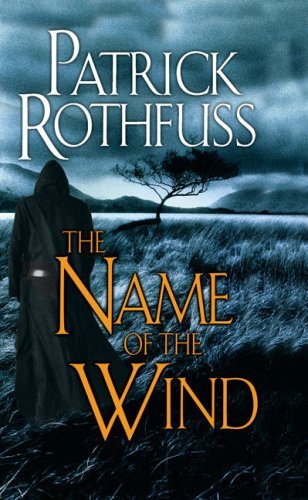My name is Kvothe.
I have stolen princesses back from sleeping barrow kings. I burned down the town of Trebon. I have spent the night with Felurian and left with both my sanity and my life. I was expelled from the University at a younger age than most people are allowed in. I tread paths by moonlight that others fear to speak of during day. I have talked to Gods, loved women, and written songs that make the minstrels weep.
You may have heard of me.
That little back cover excerpt encapsulates everything that’s wonderful about The Name of the Wind—for my money one of the strongest fantasy debuts of the last decade or so, and a novel I can’t recommend enough to everyone who enjoys fantasy and to many people who usually don’t. It’s high adventure, grand drama and sweeping romance, all told by one of the most memorable and entertaining characters to appear in the fantasy genre in, well, forever.
That blurb is how Kvothe starts telling the story of his life, and it immediately shows you exactly what he’s like. He’s a genius. He’s a hero. He has a gift for the dramatic, and he’s not afraid to use it. He knows how to set up his tale, and he knows how to pull you along with it in a way that makes it borderline impossible to stop reading. He is also, incidentally, a bit full of himself, in a way that’s both charming and infuriating at the same time, and he has a few flaws that he’s only marginally aware of, if at all.
But before you meet this famous—or infamous—Kvothe, you see him in his current situation. Somehow, between the almost unbelievable events that make up his life and the start of the actual novel, Kvothe has become Kote, a quiet, unassuming man who runs a small inn in a small town. He has become a shadow of himself. He has become, as the final words of the prologue sum it up so perfectly, “a man who is waiting to die.”
It’s this tension, between the brilliant young hero Kvothe and the wilted innkeeper Kote, that makes The Name of the Wind such a great novel. The framing story, in which Kote recounts his life in his own inimitable style, constantly casts a slight shadow, but the story is so captivating that it’s easy to get swept away by it. You often forget that the man who is narrating it has become a shadow of himself. How did he get from here to there?
The Name of the Wind is Kvothe’s story, but it’s also the story of an entire, well-realized fantasy world. History, religion, politics, myths—they all play a role in the story. (Explored exhaustively here on Tor.com in the Rothfuss reread.) Even though the camera is solidly focused on Kvothe throughout the novel, the world gradually takes shape as the story progresses. Kvothe’s life is shaped by a horrific event in his early youth, and this will lead him to enroll in a University for magic, become an arcanist, and explore mysteries and myths that may be better left untouched. Kvothe’s personality is so strong, and his flair for the dramatic so infectious, that it’s easy to miss many of the world-building details that Patrick Rothfuss slips into the story. And once you’ve read The Wise Man’s Fear, Book Two in the Kingkiller Chronicles, you’ll realize even more acutely how much information was packed into The Name of the Wind.
The first time I read this novel, I was simply unable to stop reading. I was actually walking around with the book, bumping into things. The last time I experienced a story with such inexorable pull was A Game of Thrones—a book that more or less ruined a vacation abroad because, rather than seeing the sights, I spent the entire time on the couch, unable to stop reading. The Name of the Wind had that same effect on me. Very few authors can move me to tears, or make me laugh out loud. Rothfuss did both, several times. I laughed. I cried. I jumped up and cheered for Kvothe. Several times I closed the book at the end of the chapter for a minute, nodding to myself, just to savor the moment. I am actually jealous of people who still have the chance to read this book for the first time, because by now I’ve read parts of it so many times that I practically know them by heart—and I still get chills, when I do reread them.
There are more original fantasy novels. There are books with more depth. There’s that ending. Yes, The Name of the Wind has flaws, which is only to be expected for a debut. And obviously not everyone will take to Kvothe, if only because he’s such a force of nature that he’s bound to rub some people the wrong way. Regardless of all of this, I’ve read very few books that are as purely entertaining as The Name of the Wind. It’s a sweeping story with an unforgettable main character and much more detail than you’d initially expect. It’s one of those books that grab you and won’t let go until you’ve turned the final page. Whether you’re new to fantasy or a long time reader of the genre, The Name of the Wind is a novel that’s simply too wonderful to ignore.
Stefan Raets reads and reviews science fiction and fantasy whenever he isn’t distracted by less important things like eating and sleeping. Many of his reviews can be found at Fantasy Literature.










